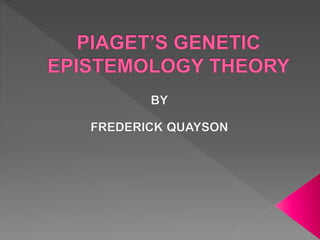
Genetic epistemology
- 2. Jean Piaget was born on 9th August, 1896 in Neuchatel, Switzerland. He died on 16th September, 1980. He was the eldest son of Arthur Piaget and Rebecca Jackson. Jean Piaget received his PhD in Biology from the University of Neuchatel in 1918. He was married to Valentine Chatenay, one of his first graduate students, in 1923.
- 3. He had three children namely Jacqueline, Lucienne and Laurent. Piaget studied the intellectual development (from infancy to language) of these children. He was a psychologist with a fundamentally biological orientation.
- 4. He called his general theoretical framework “genetic epistemology”. ”. The term "genetic" has been restricted to the mechanisms of heredity in the English-speaking world. The term can be coined to mean “development”. The term “epistemology” refers to the study of knowledge. In contemporary terms “genetic epistemology” would mean “developmental theory of knowledge”.
- 5. . Piaget believed the child’s cognitive structure increased with development. The term cognition is derived from the Latin word “cognoscere” which means “ to know” or “to recognize” or “to conceptualise”. It refers to the mental processes an organism learns, remembers, understands, perceives, solves problems and thinks about a body of information (Arul, 2012).
- 6. Piaget gave four stages of cognitive development. sensorimotor (birth to age 2), preoperational (2 to 7 years), concrete operational (7 to 11 years), and formal operational (11 years on).
- 7. The child is focused solely on sensation and movement. The child’s knowledge is limited to sensory perceptions and simple motor activities such as looking, sucking, and grasping.
- 8. This stage begins when the child starts to use symbols and language. This is a period of developing language and concepts. The child becomes egocentric. The child is capable of more complex mental representations, that is, words and images. Children are able to focus on only one aspect of a situation, problem or object, and so cannot see the big picture (Arul, 2012).
- 9. This stage is characterized by the appropriate use of logic. The child is able to sort objects in an order according to size, shape or any other characteristic. For instance, if you give them different-shaped objects, they may make a colour gradient. The child understands that quantity, length or number of items is unrelated to the arrangement or appearance of the object or items. Again, the child eliminates egocentrism.
- 10. The individual’s thought becomes increasingly flexible and abstract. The child develops the ability to systematically solve a problem in a logical and methodical way. Develops skills such as logical thought, deductive reasoning, and systematic planning.
- 11. It is based on three principles Assimilation Accommodation Equilibration
- 12. The process of taking in new information into our previously existing schemas. It refers to making associations between new information and what is already known. Assimilation takes place when a child uses an existing schema to deal with a new object or situation. eg
- 13. Refers to the process of changing our existing schemas in light of new information or experience. Eg the child who had assimilated the guinea fowl as a hen will eventually accommodate more information and thus realize the different features between a hen
- 14. Equilibration is a balance between assimilation and accommodation. When a child’s schemas can deal with most new information through assimilation, we say equilibrium has taken place. However, when new information cannot be fitted into existing schemas, we say an unpleasant state of disequilibrium has occurred
- 15. children enter school at the preoperational stage. It follows, therefore, that teachers must recognize that they (children) cannot learn concrete-operational strategies until the students have mastered the preoperational schemas. In other words, learners must start at the basic first stage and master it before they can progress well to higher stages
- 16. Furthermore, since children create knowledge for themselves teachers must arrange classroom activities that will assist and encourage self-learning Again, teachers must select appropriate learning experiences for their lessons. It should be based on their developmentaltal level Moreover, teachers should encourage group work in order to help eliminate the egocentrism that children develop during the preoperational stage of cognitive development.